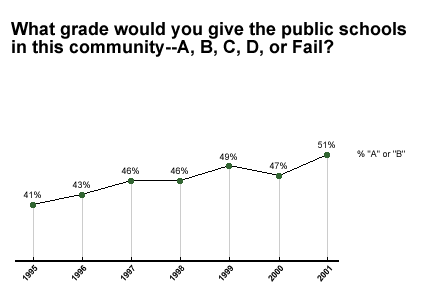In a finding that has considerable implications for the school-voucher debate, the 2001 Phi Delta Kappa/Gallup education poll* found more Americans happy with the performance of public schools than ever before in the 33-year history of the study. For the first time, a majority of Americans -- 51% -- assign a grade of either "A" or "B" to the schools in their communities. That percentage rises to 62% for public school parents and to 68% when these same parents are asked to grade the school their oldest child attends.

The voucher debate centers on whether to use public money to underwrite the cost of students to attend private schools, including religious schools. Many Americans are unfamiliar with the details of proposed voucher programs, which have varied significantly depending on the particular group advocating such approaches. The Phi Delta Kappa/Gallup poll asked about vouchers using the following wording: "Do you favor or oppose allowing students and parents to choose a private school to attend at public expense?" The PDK poll has found the number of Americans in favor of vouchers continues to drop, from 44% in 1998, to 39% in 2000, to 34% in 2001. In contrast, 72% of Americans favor reforming the existing public school system, up from 59% in 2001.
African-Americans in particular have done an about-face on the issue: the current PDK/Gallup results find a lower percent of blacks in support of allowing students and parents to choose a private school to attend at public expense than has been the case in previous years. This drop in support may suggest fewer people now see vouchers as a form of affirmative action. Supporting this notion is the finding that 44% of Republicans currently support this choice, compared to 29% of Democrats.
President Bush made vouchers a central plank in his education campaign platform, but lack of Republican support caused them to be left out of the education reform bill passed by Congress in December. The issue of vouchers remains on the table, though -- on Sept. 26, the Supreme Court agreed to address the church-state aspect of the issue when it hears challenges to Cleveland's school-voucher program, which allows the use of taxpayer money for religious school tuition. The high court is expected to rule by this summer.
The shift in public opinion as demonstrated by the PDK surveys suggests that the pressure to improve public schools may increase. Such efforts rely on the development of more consistent and reliable ways to assess the quality of public schools. The education bill that Bush signed Jan. 8 mandates that schools develop annual "report cards" that compare their standardized test scores with both local and state schools. A few already do -- the Heritage Foundation recognized Pennsylvania and Colorado in October for having the best report cards in the nation. Said Colorado Gov. Bill Owens: "That which we measure, we improve."
*Based on telephone interviews with 1,108 adults, aged 18+, conducted May-June 2001. For results based on this sample, one can say with 95% confidence that the margin of sampling error is ±3%.